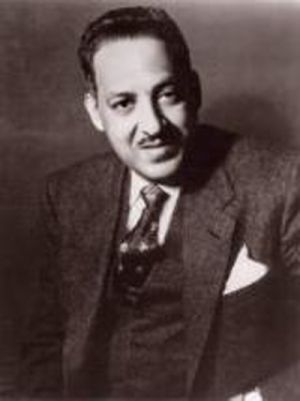
A Visit with The Judge
He had been working on two cases. One involved what looked very much like a conspiracy between The Crown Enterprises and the automobile industry to break the unions. The other, but they were connected he kept telling himself, concerned the local ramifications of the Lonnie Smith case that gave the Negroes the right to vote in Texas primaries. Marsh wanted to push it all the way. On that one he had the support of the NAACP and had even talked long and hard with Thurgood Marshall.

Thurgood Marshall (1908 - 1993)
Courtesy Howard University
-- Now there is a man who understands my Granddaddy.
Marsh tried to get his leg down off the sofa. It was no good. But he could just reach the bourbon.
-- Sip it, Man. Just sip it. Ease it into the legs.
He drifted off again, remembering things that sometimes helped him get movin' to catch up with his Daddy and his Granddaddy. And to lay the ghosts from Alabama.
It always seemed to help to flutter his head about the work that got him through Tulane. All the muscles and more of the brain than most people thought. He thought of the old Negro who taught him that one idea is worth two steam boilers. Even now, with his knees, he was five-eleven and a firm 180 pounds. Oh, he had abused his body a bit; wenching now and again and sometimes drinking too much. But he carried himself well and could out-think most anybody he encountered.
-- Yeah, down there on The River I learned what matters. People who care about people make it worth the living.
His first job had been with a tugboat company that he had humped for getting through school. They wanted him because he was good and energetic and knew The River. But they fired him after he defended the men on the barges when they tried to organize a union. He worked lines on barges up to Memphis, wandered over to Huntsville, and finally drifted down to Gadsen where he rented an apartment with room for an office above the best barber shop. His Daddy had taught him you learn a lot bein' on after-hours sippin' terms with the town barber.
It started slow but picked up as the farmers and small business folk learned he would help them with the banks and other corporations, as well as with the dreary paperwork. Sooner than he guessed he bought a cottage out on the edge of town with space for a horse and a kitchen garden. But he kept the office over the barber shop. He even seemed to listen when his clients and friends began to hint he ought to get into politics.
-- Marsh chuckled in his reverie. Tested his leg and got it to jiggle and took another nick out of the bottle. Talkin' to himself. That back then was just funnin' and everybody knew it. He just liked the law too much to leave it for politics. They were callin' him The Judge and that was enough. Then came Becky. He looked at the bottle and sighed.
She had walked past his secretary and announced: "I am Mrs. Rebecca Pinckney Langdon and from what I hear you can help me without taking my farm."
It was so absurd he became ridiculous. "You got any good mares for breedin'?"
She flounced her white pleated linen skirt over a knee and laughed. "Mr. Harland, from what I've seen you do not have room for two horses."
"You never know 'till you try."
"That's enough of that, Mr. Harland. I am here about a bank that wants to take some of my land for a debt."
-- Play time's over.
"I'm sure your husband had the title to the land in his name, so I think he's got the answer to that."
She stamped a foot. "Your knowledge of this country is limited, Mr. Harland."
Marsh remembered his Granddaddy. Careful now. "Let's start all over, Mrs. Langdon, and maybe I can help you."
"That's better, Mr. Harland. Maybe your reputation is not wholly undeserved. Can you listen?"
Table of Contents
- Maggie and Mr. Hank
- The Reverend
- Squalls Along the Flight Line
- Flying Home to Church
- A Visit with The Judge
- Communion
- Afterthoughts
- Monday Morning With The Admiral
- Into the Dining Room
- On Toward Walking the Streets
- Glimpses of An Election
- The Dream and The Reality of Violence
- The Admiral Loses More Than a Few Good Men
- Down That Lonesome Road

